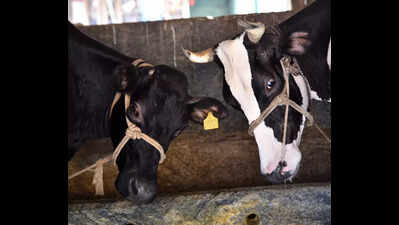Ludhiana: As the temperatures continue to soar and warnings of heatwave in the coming days, there is a need to protect dairy animals from excessive heat too. Since cattle sheds can also become excessively hot during summers, which not only adversely impacts animal health affecting the milk yield, but it also means delayed reproduction. To address the challenges of changing environment and increasingly warming temperatures, experts at Guru Angad Dev Veterinary and Animals Sciences University (Gadvasu) have been taking measures by making climate resilient and mechanized sheds to mitigate the impact of temperature rise to the maximum extent possible.
These climate resilient sheds tend to keep the temperature 4-5 degree Celsius lower than outside. Such sheds involve use of fans, foggers and fountains to lower the temperature. Rapidly rising temperatures not only make animals more vulnerable to illness, but also impact the quality of yield.

It also affects their reproduction. Since the fodder also gets affected by high temperatures, experts are trying to resolve the problem of lack of availability, drying and deteriorated quality of fodder in summer. To deal with such situations, they are making silage for animals so that the same level of nutrition can be given to animals throughout the year.
Vice-chancellor Dr Jatinder Paul Singh Gill said the varsity had developed climate-resilient sheds to adapt to changing weather and in order to demonstrate how temperature of sheds could be lowered. He added that the sheds were mechanized to keep temperatures low. "The climate-resilient sheds keep the temperature lower inside.
When the temperature and humidity inside sheds increases, fans get turned on to keep the animals cool," he said. Moreover due to rising temperature, the animals don't get ready for reproduction. A delay in heat for three-four months means a loss of offspring as well as monetary loss of at least Rs 10,000 for the farmers.
The indigenous breeds are more resilient to hot weather conditions, but they have lower production whereas the exotic breeds like jersey cows feel the heat more. "So efforts are being made to improve milk production in indigenous breeds and make exotic breeds more tolerant to warming up weathers by climate resilient sheds and mechanized dairies," he said..















